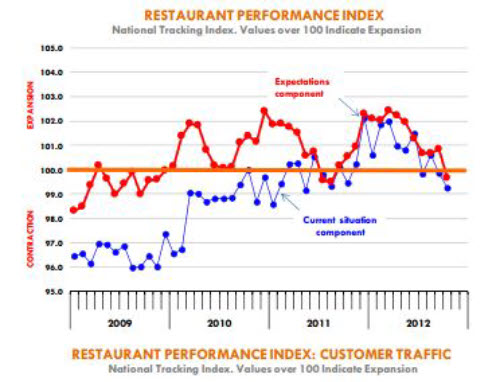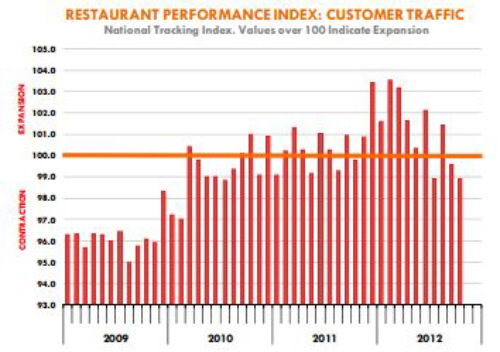



CME: Restaurant Index Drops Below 100 points
Alarm bells should be ringing for beef and pork demand following the latest NRA Restaurant Performance Index, writes the CME Group. The
index has been trending lower for much of this year but the latest
numbers showed a significant decline in both the current conditions
component as well as the outlook for the next few months.
The
overall index for October is now pegged at 99.5 points, down 0.9 per cent
points from the previous months, below the 100 point threshold
that indicates business expansion. This was the first time since
August 2011 that the index has dropped below the 100 point mark.
The index has been pointing to softer business conditions in the
restaurant industry since July when the current component index
dropped below the 100 point mark. What had helped prop up the
overall index in the last four months was the expectation that business was likely to improve.
It usually takes plenty of optimism to
make it in the restaurant business. But after a number of months
of disappointing sales and especially foot traffic, it appears that
operators are now taking a dimmer view of business outlook in
2013.
The index tracking same store sales was running as high as
105.2 last December, the best performance since 2004. However, by
October, the same store sales index was down to about 100.4, still
pointing to expansion but not by much.
The more troubling indicator in our view is the
steady erosion in foot traffic.

The customer traffic indicator
was about 103.5 as late as February but it has now dropped to
about 98.9, almost 5 per cent point drop in a matter of months. Restaurants are able to post higher same store sales by increasing prices
or extending hours.
At some point, however, you need more people
coming through the doors to sustain revenue growth. The decline
in foot traffic is likely in part due to higher rates of food inflation at
foodservice vs. grocery retail.
The data for October showed that
inflation for food consumed at home was up less than 1 per cent from a
year ago. On the other hand, inflation for food consumed away
from home rose 2.7 per cent vs. October 2011.
Foodservice operators have
been struggling with margins for some time and it does not look
like things will get better in the short term. Prices for center of the
plate items, especially beef, have escalated in recent months.
Cattle prices may be only about 2 per cent higher than a year ago but forward
prices point to all time record highs, with April futures closing on
Friday at 134.575. The offers from packers and distributors for
future business are derivative of these sharply higher future prices.
No wonder restaurant operators feel a little less optimistic about
future business than they did a few months ago.

While recognizing the bearish implications of the
latest NRA report, it is important to recognize that foodservice demand largely reflects the broader trends in the economy.
One factor that correlates very strongly with foodservice business (and the RPI index) is the pace of job growth. More recently, the economy has been adding around 170k jobs a month (vs.
252k last winter).
If this pace of job growth is sustained or
moves back to the 250-300k jobs/month area, we should see the
RPI index back to 101.5-102.0 area and foot traffic back in expansion territory.








